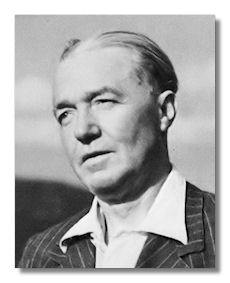
The Internet's Premier Classical Music Source
Related Links
-
Find CDs & Downloads
Amazon - UK - Germany - Canada - France - Japan
ArkivMusic - CD Universe
Find DVDs & Blu-ray
Amazon - UK - Germany - Canada - France - Japan
ArkivMusic-Video Universe
Find Scores & Sheet Music
Sheet Music Plus -
Recommended Links
Site News
Ernest John Moeran

(1894 - 1950)
Ernest John Moeran (Jack to family and friends) was born in 1894 in Norfolk to a Norfolk-born mother (who, incidentally survived him) and an Irish-born Anglican priest. The influence of the barren Norfolk geography and his Irish ancestry never left him, and he was found dead (in 1951) in Kenmare, Ireland, in the river where he was said to have suffered a cerebral hemorrhage but perhaps took his own life. He learned piano on his own, then studied music early and went to the Royal College of Music where he encountered the music of Elgar, met Delius, and became thoroughly imbued with the music of his time. He saw service during WWI, during which he was grievously wounded by shrapnel, and his head was fitted with a metal plate as a result of his injuries. These sorts of injuries appear to have tremendous emotional problems as well as the very obvious physical ones, and for the remainder of his life he suffered in various ways from this injury: it is said that he was an abuser of alcohol, although some of these symptoms may resemble those of sufferers of severe head injuries (occasional problems with walking, slurred speech, etc.). Further, those who have plates in their heads were then enjoined from drinking alcohol, while acknowledgement was made that alcohol might be seen to provide a respite from the pain and problems.
After the war, suffering the frequent effects of artists (and all) who have undergone such severe trauma, Moeran nevertheless reentered the RCM and resumed his musical education, behaving generally like many other young men of his age. He became friendly with John Ireland, Harriet Cohen (who gained as much fame as Bax's beloved as she did as a pianist), Arnold Bax, and, especially, Peter Warlock (or Philip Heseltine when he was writing musical criticism). He fell in and out of love, but the primary love of his life was Peers Coetmore, whom he courted with the wonderful Cello Concerto. (For years the only recording of the concerto was that of its dedicatee, Ms. Coetmore, which did not do justice to this wonderful piece. Now there is a recording by Raphael Wallfisch which gives much more insight into what a truly lovely composition it is. BTW, the courtship was successful, the marriage was not.)
By the middle of Moeran's life he had turned strongly to his Celtic roots, delighting in Ireland, its people, and its scenery and returning there frequently. His symphony was a work which reflected the dichotomy of both his English and Irish backgrounds.
Moeran is, these days if he is mentioned at all, most frequently likened to Vaughan Williams and does, indeed, belong more to the pastoral school of English music of the 20th century rather than to the urban, urbane, and sophisticated style of a Walton or a Lambert. However, he has his own voice, distinctive and lovely, and is not the "light-weight" which is all too frequently used to characterize some composers who use folk material as their source or inspiration. ~Jane Erb
Recommended Recordings
Recommended Work
- Recommendation to come…
-













